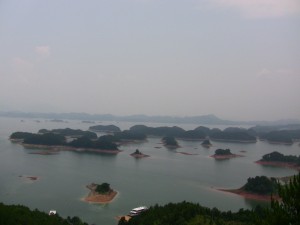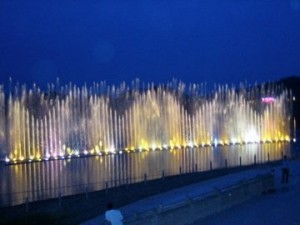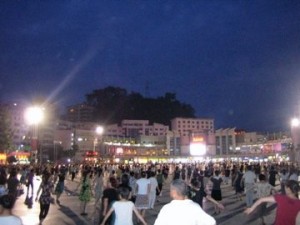Thousand Island Lake (千岛湖) Posted by Stephen on May 15, 2012 in Uncategorized
 Well it’s that time of the year again in China when temperatures (温度 wēn dù) rise (上升 shàng shēng) and a great deal of humidity (潮 cháo) descends upon the mainland (大陆 dàlù).
Well it’s that time of the year again in China when temperatures (温度 wēn dù) rise (上升 shàng shēng) and a great deal of humidity (潮 cháo) descends upon the mainland (大陆 dàlù).
Whether you live in 北京,上海 or 重庆,summer (夏天 xià tiān) always comes early in China. For some people, air conditioning (空调 kōng tiáo) provides a safe haven from the muggy, hot streets outside.
For those that can tolerate being outside, bottled beer (啤酒 pí jiǔ), water (水 shuǐ) and ice cream (冰淇淋 bīng qí lín) will help you weather the heat, but only for a short time. In mega-cities like Beijing and Shanghai, the sheer amount of concrete and pavement further heats the cities, creating an oven that absorbs and locks in high temperatures even throughout dusk (薄暮 bó mù). At some point, you need to get out of the city and cool off.
For most foreigners, we usually beat the heat by heading to some body of water. However, in China, there aren’t too many clean lakes, shorelines or rivers available for leisure. Finding them is tricky, as the well known ones are often crowded beyond capacity. Sure you can ask travel agents, citizens or foreigners, but odds are they’re going to tell you the same five places highlighted by the Chinese Ministry of Commerce and Tourism (and most of them will be a wash).
That being said, ask enough people and travel enough, and you will find a nice place to cool off. For me that place was 千岛弧 (Qiān dǎo hú) or Thousand Island Lake, which is situated about a two hour bus ride northwest of Hangzhou. Click here for previous post on Hangzhou.
Video Slideshow of Thousand Island Lake tour:
 Touted as one of the few pristine water tables of China (many Chinese bottled water companies draw from 千岛湖), Thousand Island lake is filled with large mouth bass (a delicacy there) and wildlife that seems almost non-existent in the rest of China. Originally it was a gorge, filled in by a dam project, now it is one of the little known secrets among Chinese citizens (we were the only two foreigners in the entire city) looking to get out on the water.
Touted as one of the few pristine water tables of China (many Chinese bottled water companies draw from 千岛湖), Thousand Island lake is filled with large mouth bass (a delicacy there) and wildlife that seems almost non-existent in the rest of China. Originally it was a gorge, filled in by a dam project, now it is one of the little known secrets among Chinese citizens (we were the only two foreigners in the entire city) looking to get out on the water.
By day you can take a boat or ferry ride to many different islands which act as animal sanctuaries (housing monkeys, snakes, birds and reptiles). You can also fish, partake in water sports and even go on a scenic gondola ride overlooking most of the “one thousand” islands.

By night, you can relax by the water front, watching dazzling lit fountain displays while the locals gather to sing and dance in a square of thousands. The food has a distinct southern feel to it, and every restaurant you pass by will have live freshwater fish and other creatures, swimming in a tank, just waiting to be chosen for dinner.
The food has a distinct southern feel to it, and every restaurant you pass by will have live freshwater fish and other creatures, swimming in a tank, just waiting to be chosen for dinner.
Just be forewarned, almost no one in 千岛湖 speaks English, so your Chinese skills will be put to good use. Grab a beer, take a seat on the water, and start up a conversation with some 朋友s.
Follow Steve on twitter: @seeitbelieveit

Build vocabulary, practice pronunciation, and more with Transparent Language Online. Available anytime, anywhere, on any device.
About the Author: Stephen
Writer and blogger for all things China related. Follow me on twitter: @seeitbelieveit -- My Background: Fluent Mandarin speaker with 3+ years working, living, studying and teaching throughout the mainland. Student of Kung Fu and avid photographer and documentarian.




Comments:
workout:
I am in fact grateful to the holder of this site who has shared this
enormous paragraph at here.
Rachel Ramirez:
Olá Stephen,
Greetings from Portugal. I found your blog when searching for info. about the “gyotaku / fish printing competition” in China at the Thousand Island Lakes. A news report in English can be seen at http://english.cntv.cn/program/cultureexpress/20110629/104392
I want to contact the man who is the father of Yang Tianzhou
and published the book “Painting the Fish of a Thousand Island Lakes” or to contact anyone who knows about this competition held in June 2011. I wondered if you have heard about this or know of this book or any information about fish printing activities at the Thousand Island Lakes? Any info.would be greatfully appreciated as I am researching gyotaku for my PhD but do not speak/write Mandarin.
Many thanks & best wishes, Rachel Ramirez.